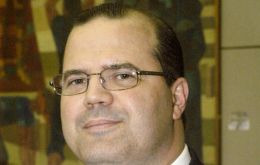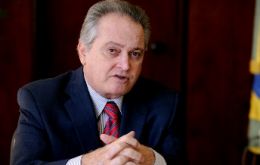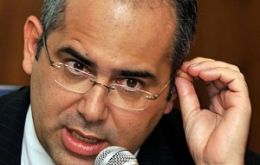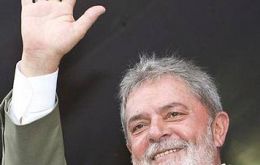MercoPress. South Atlantic News Agency
Tag: Brazil
-
Wednesday, January 5th 2011 - 09:09 UTC
Brazil and Chile Battle Rising Currencies

Brazil on Tuesday threatened tougher capital controls and other measures to keep its currency from rising against the dollar, a day after Chile's central bank unveiled its own $12 billion plan to buy greenbacks.
-
Sunday, January 2nd 2011 - 21:07 UTC
President Rousseff promises greater consistence for Mercosur and Unasur

In her inauguration speech Brazilian President Dilma Rousseff promised greater consistence for Mercosur and Unasur so that the region can become an essential component of the “coming multipolar world”. She also anticiapted closer relations with all countries from Latinamerica, the Caribbean and Africa and the peoples of Middle East and a greater role for Brazil in world political and financial affairs.
-
Thursday, December 23rd 2010 - 08:46 UTC
Brazilian central bank inflation warning; rate hike expected in January

Brazil's central bank reiterated Wednesday its clear commitment to raise interest rates soon, as the outlook for inflation has become “far less favorable” than it had previously thought.
-
Thursday, December 23rd 2010 - 08:39 UTC
Brazilian soy crop estimate up; coffee prices reach a 13-year high

Soybean growers in Brazil, the world’s largest producer after the U.S., may harvest more of the oilseeds next year than the government estimated earlier this month, Agriculture Minister Wagner Rossi said on Wednesday.
-
Thursday, December 23rd 2010 - 07:20 UTC
Hillary Clinton will represent Obama at Rousseff’s inauguration January first

Secretary of State Hillary Clinton will head the United States delegation to attend the inauguration of Brazilian president-elect Dilma Rousseff next January first, announced Wednesday the White House.
-
Wednesday, December 22nd 2010 - 05:18 UTC
Carter wants Brazil to play a role in Mid East peace; US mediation exhausted

On the same day that work began on a new Palestinian embassy in Brasilia, Brazilian president Lula da Silva said that peace in the Middle East was impossible with the United States as a mediator, reported the Palestine News Network.
-
Tuesday, December 21st 2010 - 19:34 UTC
Brazilian exports set to increase 12% in 2011 reaching 220 billion US dollars

Following the 30% expansion in 2010, Brazilian exports are forecasted to grow 12%, in 2011 according to Foreign Trade Secretary Weber Barral. He added that in 2010 the recovery was quite strong compared to the downturn of 2009, but in 2011 global trade growth rate is expected to slow down.
-
Tuesday, December 21st 2010 - 02:52 UTC
Lula da Silva admits he could run again for office, if things go bad

Brazil's outgoing President Lula da Silva said he might run for president again some day, Folha de S. Paulo newspaper reported, a revelation that could weaken his chosen successor.
-
Monday, December 20th 2010 - 22:06 UTC
Brazilian lawmakers among the best paid in the world

With the recent 62% increase Brazilian lawmakers (Lower House and Senate) will be among the best paid in the world, ahead of European and US peers and from other emerging economies.
-
Monday, December 20th 2010 - 05:32 UTC
Brazil world fourth largest market for the auto industry: 3.45 m sales in 2010

Brazil has become the world’s fourth largest market for the automobile industry with sales of 3.45 million in 2010, up 9.8% over 2009, and is also attracting massive overseas investments to the industry, reports Anfavea the Brazilian Association of automobile manufacturers.Brazil now stands behind China, United States, Japan and ahead of Germany.
